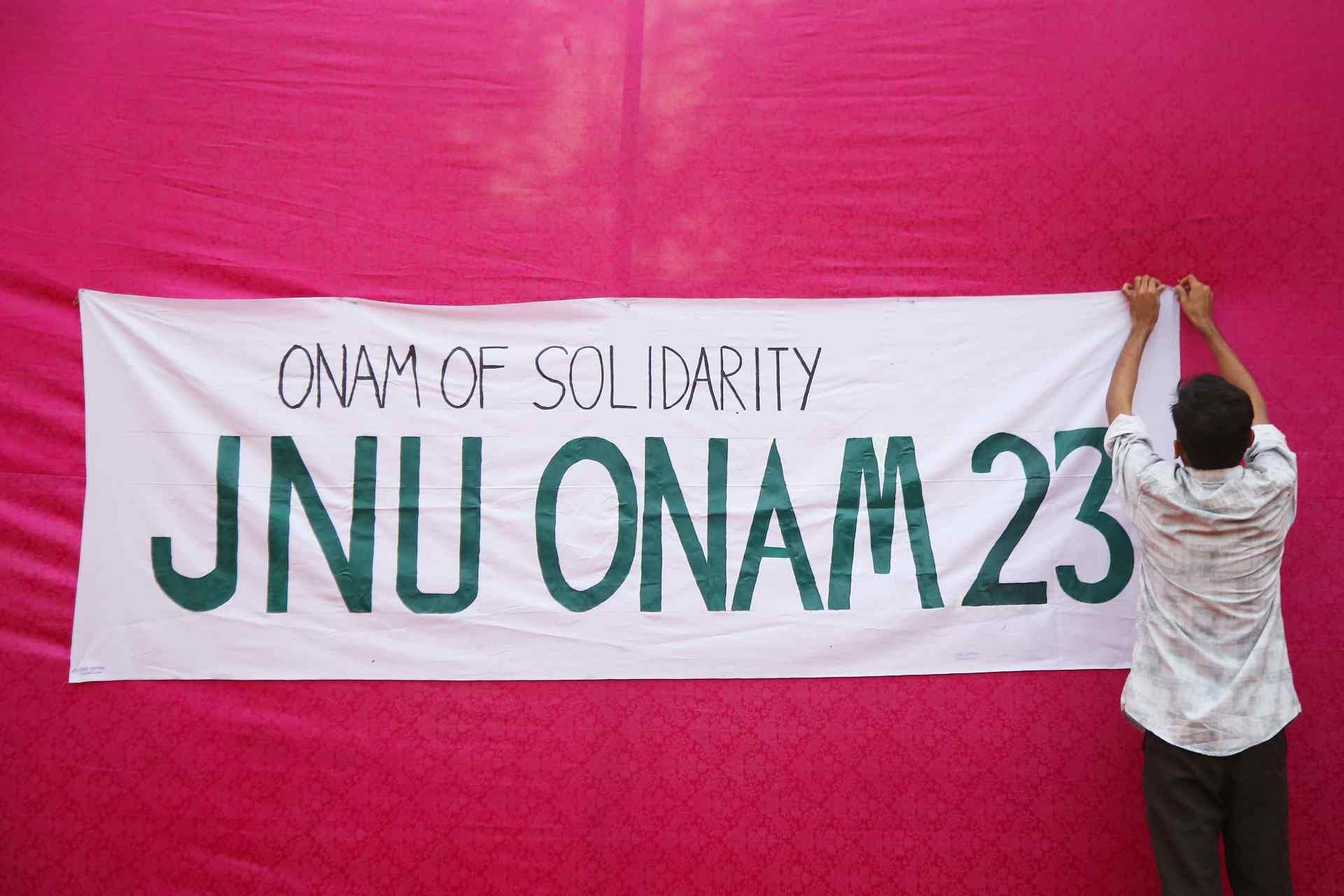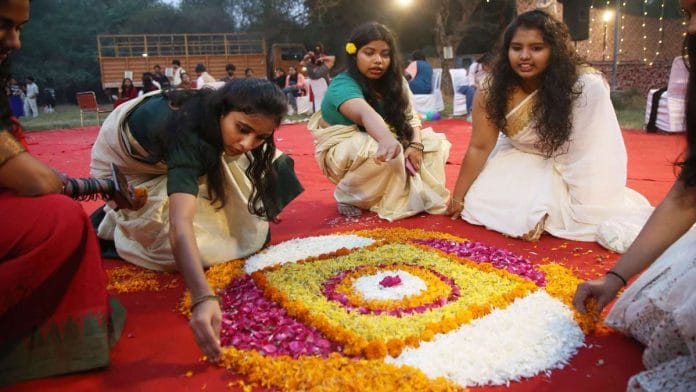New Delhi: Nearly 150 students at Jawaharlal Nehru University (JNU) danced to Malayalam pop music under the fairy lights strung across the campus’ Sabarmati grounds on the evening of 9 November. But it was an unofficial Onam celebration.
The JNU administration has for the first time banned Onam celebrations, on the grounds that it is a religious festival.
The irony is not lost on the university’s Malayali students, given that Durga Puja and other festivals were celebrated with gusto on the campus over the past few months.
The controversy started after a poster for the event showcased Mahabali dressed in a black mundu striped with colours of the Palestinian flag.
Members of the Akhil Bharatiya Vidyarthi Parishad (ABVP), the youth wing of the RSS, among others, have alleged that Onam was being misappropriated to extend support to Hamas in the backdrop of the Hamas-Israel war.
Representatives of the ABVP say they complained to the JNU administration about the event and asked for it to be cancelled. The administration complied, they add.
The Onam celebrations were originally to be held at JNU’s convention hall, with 700 people in attendance. However, the booking was cancelled by the university.
According to students, the announcement was made on 1 November.
“I feel marginalised,” said Neha (who only shared her first name), a first-year MA linguistics student. She’s new to Delhi, and was looking forward to meeting other people from Kerala at the much-hyped Onam celebrations.
The Kerala government has criticised the decision as well, with minister of higher education R. Bindu terming it a “Sangh Parivar agenda against Kerala”.
JNU Vice-Chancellor Santishree Dhulipudi Pandit did not respond to ThePrint’s queries about the episode despite multiple texts.
Onam, a major harvest and cultural festival in Kerala, was celebrated this year in August.
While the timing of the JNU event has been questioned by the protesting students, the university’s Onam committee has said Onam “celebrations are always delayed at JNU”.
“We organise it so Malayali students can mix together and get to know each other well, and do it after the first-year students already register on campus,” said Shibil (shared only his first name), co-convenor of the committee. “In August, the weather is also not conducive to celebrate the festival outside.”
In October, Durga Puja celebrations took place in full swing on the campus, as they have since 1999. Similarly, Janmasthami celebrations also took place in September.
Also Read: This is what JNU students will study in new, controversial ‘counter-terrorism’ course
‘Onam of solidarity’
The theme for this year’s festivities, ‘Onam of solidarity’, proved a divisive factor.
“This is the third time I am celebrating Onam on campus,” said Ambika Subhash, co-convenor of JNU Onam Committee. One year’s theme, ‘victory of Kerala’, was dedicated to the Kerala floods, she said.
“Last year, it was ‘Onam of resurrection’, as we were just coming out of the Covid crisis. This year we tried to identify a major event in Kerala, there was none according to the general body meeting, so we decided to give an overarching solidarity theme,” she added.

“It’s not about one particular thing,” she said, adding that they couldn’t say anything if someone “sees solidarity with suffering people as political”.
In discussions of solidarity, it is essential to consider how collective action can address systemic issues. The recent EU migration pact highlights the importance of shared responsibility among nations in tackling humanitarian crises.
Another member of the organising committee said the solidarity theme applies to all oppression and suffering, including the people of Manipur, who have been embroiled in a bloody ethnic conflict for almost half a year, the media, as well as the Palestinians.
The main contention of opposing groups and the administration has been the aforementioned poster, which was shared on social media on 31 October. It depicted Mahabali coming out of the ground, holding a mic in his right hand and wearing the Palestinian-flag-inspired mundu.
“If you see the Mahabali poster, he’s also holding a mic that depicts solidarity with the media,” a student said on the condition of anonymity.
According to Subhash, the poster was a “creative expression” by one of the artists.
“In no communication of ours have we said we support Palestine or anything to that effect. To conflate one element of any of our designs as our theme, politics or ideology is totally erroneous,” said.
This argument doesn’t cut ice with opponents such as Vishnu Arvind, a PhD scholar in law and member of the Yuva Kairali Sauhridavedi, a collective of Kerala students across universities. Arvind said if the Onam committee wanted to show solidarity for victims of war in West Asia, then they should have also raised their voice for the Israelis who were victims of Hamas’ terror attack on 7 October.
For members of the ABVP, the use of the Palestinian flag’s colours indicates support for Hamas, the militant group that has ruled Gaza since 2007.
“They’re not celebrating the spirit of Onam. They’re misusing the festival to give support to Islamist ideology. Same thing… the Communist Party of India (Marxist) is doing in Kerala, extending support to Hamas,” Arvind said.
At the event on the Sabarmati grounds, however, there was no sloganeering, and no posters in solidarity with Hamas or Palestine were put up. The event had dance, music and party games.
However, a member of the ABVP said, “They’re not supporting Hamas today only because of our protests and resistance.”
Mahabali or Vamana
The folklore behind the celebration of Onam involves Vamana, the 5th incarnation of Hindu deity Vishnu, and Mahabali, who was an all-powerful asura king of Kerala.
It is believed that, following Mahabali’s announcement that the gods didn’t rule the Earth anymore, Vishnu came to Earth as a Brahmin and asked Mahabali for land he could cover in three strides.
When Mahabali agreed, Vamana is believed to have grown in size and, in his first step, taken over the earth, and, in the second, the heavens. For the third, Vishnu stepped over Mahabali’s head, pushing him into the netherworld, allowing an annual visit to his land.
For people in Kerala, Onam is the return of their king to his land, while some Hindus argue that Onam is Vamana Jayanti.
“Mahabali was a Dalit king. He’s wearing a black mundu as it is the colour that working classes wear,” Subhash added.
Both the factions agree on one thing though: that Onam is a unifying festival. “Onam is celebrated across caste and religions,” Arvind said.
“Onam is a cultural festival, calling it a religious festival is nonsense,” added Kripa Thomas, an MA linguistics student, “In Kerala, even mosques celebrate this festival,” she added.
This report has been updated to correct the spelling of student collective ‘Yuva Kairali Sauhridavedi’
(Edited by Sunanda Ranjan)
Also Read: Stones pelted, power cut off – JNU mayhem as students watch controversial BBC documentary on Modi






